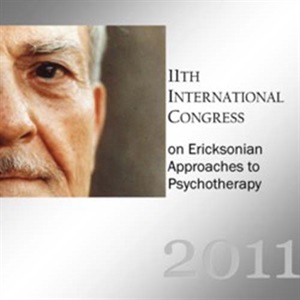
- Average Rating:
- Not yet rated
- Topic Areas:
- Conversation Hours | Brief Therapy
- Categories:
- Erickson Congress | Erickson Congress 2011
- Faculty:
- Wendel Ray, PhD
- Duration:
- 1:00:44
- Format:
- Audio Only
- Original Program Date:
- Dec 10, 2011
- Short Description:
- IC11 Conversation Hour 05 – Paul Watzlawick: Master of Brief Therapy – Wendel Ray, PhD
- Price:
- $15.00 - Base Price
Tags: Brief Therapy Paul Watzlawick
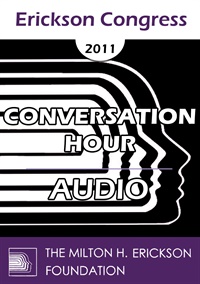
- Average Rating:
- Not yet rated
- Topic Areas:
- Conversation Hours | Femininity | Gender
- Categories:
- Erickson Congress | Erickson Congress 2011
- Faculty:
- Consuelo Casula, Dipl. Psych
- Duration:
- 54:15
- Format:
- Audio Only
- Original Program Date:
- Dec 10, 2011
- Short Description:
- IC11 Conversation Hour 06 – How Erickson Treated Women – Consuelo Casula, Lic. Psych
- Price:
- $15.00 - Base Price
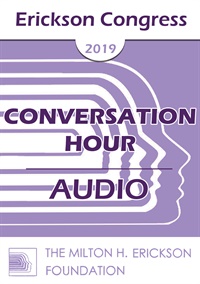
- Average Rating:
- Not yet rated
- Topic Areas:
- Conversation Hours | Psychotherapy | Brief Therapy | Strategic Therapy | Utilization
- Categories:
- Erickson Congress | Erickson Congress 2019
- Faculty:
- Eric Greenleaf, PhD
- Duration:
- 59 Minutes
- Format:
- Audio Only
- Original Program Date:
- Dec 13, 2019
- Short Description:
- Participants will discuss the place of emotional expression in the conduct of modern brief, strategic and hypnotic psychotherapies.
- Price:
- $15.00 - Base Price
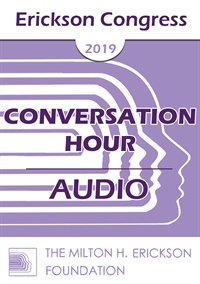
- Average Rating:
- Not yet rated
- Topic Areas:
- Conversation Hours | Therapist Development | Therapeutic Relationship
- Categories:
- Erickson Congress | Erickson Congress 2019
- Faculty:
- Scott Miller, PhD
- Duration:
- 1 Hour 2 Minutes
- Format:
- Audio Only
- Original Program Date:
- Dec 13, 2019
- Short Description:
- In this hour-long discussion, participants will have an opportunity to address questions regarding deliberate practice and their use of routine outcome measures in clinical practice.
- Price:
- $15.00 - Base Price
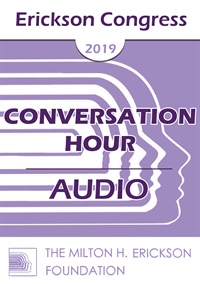
- Average Rating:
- Not yet rated
- Topic Areas:
- Conversation Hours | Art and Creativity | Communication | Humor
- Categories:
- Erickson Congress | Erickson Congress 2019
- Faculty:
- Michael Hoyt, PhD
- Duration:
- 1 Hour 3 Minutes
- Format:
- Audio Only
- Original Program Date:
- Dec 14, 2019
- Short Description:
- For many, Erickson set the prototypical example of how to be creative and often evoked a You Said What?! (YSW?!) reaction from clients and students. As we describe in the new book, Creative Therapy in Challenging Situations: Unusual Interventions to Help Clients (Hoyt & Bobele, 2019), such YSW?! interventions are particularly useful and effective when approaching unusual client problems.
- Price:
- $15.00 - Base Price
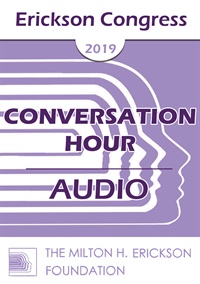
- Average Rating:
- Not yet rated
- Topic Areas:
- Conversation Hours | Meditation, Spirituality and Yoga | Multicultural | Religion
- Categories:
- Erickson Congress | Erickson Congress 2019
- Faculty:
- Tamer Dovucu, MA
- Duration:
- 57 Minutes
- Format:
- Audio Only
- Original Program Date:
- Dec 14, 2019
- Short Description:
- In Turkey I had the opportunity to research the resources about Sufism (for example Rumi is the most well known sufi in the world and he lived in Turkey) and I studied it both as a student and as a therapist about 15 years. Sufism has actually two big steps. Understanding yourself and life first by mind than by heart. While I was creating the Optimum Balance Model (OBM) I think I did the first part. During this conversation I'll try to explain steps of the inner journey of a Sufi, I'll share my experiences and the story of how they try to tame their Ego.
- Price:
- $15.00 - Base Price
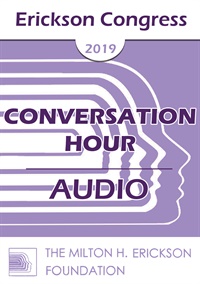
- Average Rating:
- Not yet rated
- Topic Areas:
- Conversation Hours | Eating Disorders | Ericksonian Hypnosis and Therapy Techniques | Anorexia | Family Therapy
- Categories:
- Erickson Congress | Erickson Congress 2019
- Faculty:
- Camillo Loriedo, MD, PhD
- Duration:
- 1 Hour 1 Minutes
- Format:
- Audio Only
- Original Program Date:
- Dec 14, 2019
- Short Description:
- Eating Disorders are a good example of massive interdependence among family members. Salvador Minuchin described families with Anorexia Nervosa as enmeshed families, and the interdependence it is certainly the base for enmeshment. Recent studies as well as more extended clinical experiences demonstrate that although bulimia appears to produce less reciprocal involvement, and some other form of apparent disengagement, we really can say that reciprocal interdependence in the family it always present, even if it assumes more hidden and complex forms.
- Price:
- $15.00 - Base Price
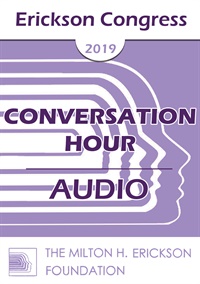
- Average Rating:
- Not yet rated
- Topic Areas:
- Conversation Hours | Genomics | Brief Therapy | Psychotherapy | Neuroscience
- Categories:
- Erickson Congress | Erickson Congress 2019
- Faculty:
- Kathryn Rossi, PhD
- Duration:
- 58 Minutes
- Format:
- Audio Only
- Original Program Date:
- Dec 14, 2019
- Short Description:
- Great strides have been made in PsychoSocial Genomics as well as the placebo effects in psychotherapy. We will share our views of how these new state-of-the-arts sciences can gently be integrated into psychotherapy sessions and improve outcomes.
- Price:
- $15.00 - Base Price
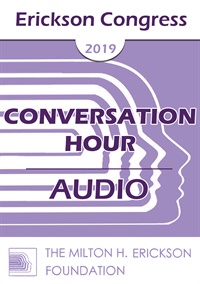
- Average Rating:
- Not yet rated
- Topic Areas:
- Conversation Hours | Art and Creativity | Hypnosis
- Categories:
- Erickson Congress | Erickson Congress 2019
- Faculty:
- Carol Kershaw, EdD | Bill Wade, PhD
- Duration:
- 59 Minutes
- Format:
- Audio Only
- Original Program Date:
- Dec 14, 2019
- Short Description:
- Explore the latest research in optimal functioning, creativity, and flow and how to help clients achieve this state more frequently.
- Price:
- $15.00 - Base Price
Tags: Art and Creativity Hypnosis
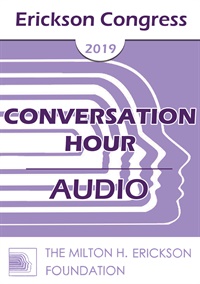
- Average Rating:
- Not yet rated
- Topic Areas:
- Conversation Hours | Ericksonian Hypnosis and Therapy Techniques | Gender | Masculinity | Psychotherapy
- Categories:
- Erickson Congress | Erickson Congress 2019
- Faculty:
- Rick Miller, MSW
- Duration:
- 54 Minutes
- Format:
- Audio Only
- Original Program Date:
- Dec 14, 2019
- Short Description:
- Learn Ericksonian principals for encouraging men to participate and enjoy psychotherapy. Utilize strategies for dealing with their own biases regarding difficult men. Expand definitions of healthy masculinity.
- Price:
- $15.00 - Base Price
Please wait ...

